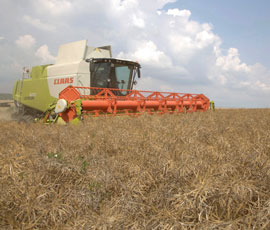Play all audios:
INCORRECTLY COMPLETED GRAIN PASSPORTS ARE LEADING TO DELAYS AND EVEN REJECTIONS OF LOADS ARRIVING AT MILLS, PORTS AND STORES. This harvest, there have already been several reports of
hauliers turning up at mills with loads only to be turned away because of incomplete forms. “The hauliers get frustrated because their lorries are not turning round the loads as fast as they
can,” according to one trader. “Some hauliers who are meant to be doing three loads a day are being reduced to two.” The 2011 Combinable Crops Passport carries a number of changes from
previous years and some growers are being caught out. “The forms are asking growers to provide more specific details in areas and they have been overlooking these parts and leaving some
boxes not ticked,” says the trader. The new version of the passport was introduced in January to comply with the EU’s new Renewable Energy Directive (RED) for biofuel. For example, it now
requires growers to declare that their crop has been grown conventionally and is non-GM. A new signature declaration to meet the requirements of the Directive, which is compulsory where
oilseed rape or wheat may be entering the biofuel supply chain, has also been added. In addition, there have been reports of growers taking holidays and passing on the responsibility to a
staff member, who has not been trained about how to complete the forms correctly. To keep the grain movement process running smoothly, the NFU is advising growers who are uncertain over
which sections apply to consult their merchant, who is responsible for providing information on what is required by the end-user. “A box not ticked or a bit of form not signed has quite
serious implications, especially in terms of the Renewable Energy Directive,” says NFU chief arable adviser Guy Gagen. Penalties of £200 to £300 are common for rejected loads and the burden
usually falls on the grower, he adds.

